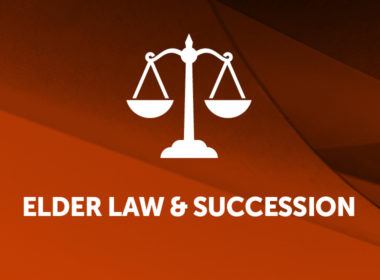Key decisions
- Edwards v Edwards [2023] NSWSC 1067 (Forfeiture rule)
- Nesci-Lawrence as Executor of the Estate v Ginbey [2023] WASC 339 (Freezing order)
- SCAG update (Digital records and Powers of Attorney)
- Keates v Martin and Martin [2023] TASSC 31 (Non-revocation of will by marriage)
- In the Estate of Frederick Allwood [2023] NTSC 72 (Testamentary capacity)
- Intergenerational Report 2023
- Kadiev v Petrov [2023] NSWSC 1031 (Court barring claims against estate)
- Jedrzejewska v Sheedy [2023] VSC 511 (Passing over executor)
Application of forfeiture rule on inheritance of joint tenancy
Sharon and John Edwards owned three parcels of real estate in NSW as joint tenants at the date of her death in March 2915. The properties were worth $1.15 million at Sharon’s death. John was found guilty of murdering Sharon and sentenced to imprisonment. The conviction was maintained on appeal and no application was made for special leave to appeal to the High Court of Australia.
Sharon’s will appointed John as executor and left her estate to her three children equally. John renounced his appointment as executor. Sharon’s estate was worth $791 plus any interest in the three parcels of real estate. In Edwards v Edwards [2023] NSWSC 1067 (Henry J) the Court determined that by virtue of the forfeiture rule John was precluded from inheriting on survivorship.
The Court was satisfied on the civil standard that John had killed Sharon having regard to: the certificate of conviction which was admissible under s 178 of the Evidence Act 1995 (NSW) and established that John was convicted of Sharon’s murder (at [25]); the judgment of the Court of Criminal Appeal unanimously dismissing the appeal and disclosing a very careful and extensive consideration of the evidence in support of the verdict of murder (at [26]); the absence of a further appeal to the High Court of Australia (at [27]); and John’s non-opposition to the making of the orders sought (at [28]).
Applying the rule of forfeiture in this situation, the result was that while John ‘was recognised at law as entitled to be the sole registered proprietor of the [parcels of real estate] by right of survivorship that benefit does not accrue to [him] and he holds a half interest in each of the [parcels of real estate] upon trust for the deceased’s estate in equal shares and the deceased’s estate is to be regarded as the owner in equity of the undivided half share in the [parcels of real estate]’ (at [33]). The administrator of Sharon’s estate was therefore entitled to orders for the appointment of trustees for sale of the parcels of real estate pursuant to s 66G of the Conveyancing Act 1919 (NSW) (at [33]).


